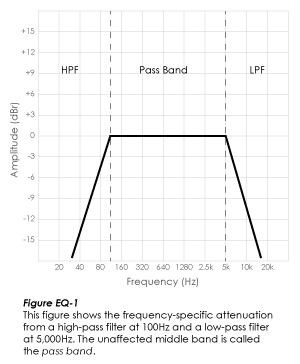A high pass filter is a critical tool in audio production that allows for precise control over the low-frequency content of a sound signal. It is commonly used to remove unwanted low-frequency noise or to sculpt the tonal balance of a recording. In this article, we will explore the functions and applications of high pass filters in audio production.
What is a High Pass Filter?
A high pass filter is an audio processing tool that attenuates or cuts off frequencies below a certain cut-off point while allowing higher frequencies to pass through unaffected. This cut-off point is determined by the filter’s settings and is measured in Hertz (Hz).
The Function of a High Pass Filter
High pass filters are used to eliminate low-frequency rumble, stage noise, and other unwanted sounds that may compromise the clarity and quality of a recording. By removing these low-frequency components, a high pass filter helps to clean up the audio signal and makes it more focused and defined.

Credit: theproaudiofiles.com
Applications of High Pass Filters
High pass filters have a variety of applications in audio production. Some common uses include:
- Removing rumble and hum: High pass filters can eliminate low-frequency background noise such as air conditioning hum or ground loop interference.
- Improving clarity: By removing unnecessary low-end frequencies, high pass filters can make vocals and instruments sound clearer and more defined.
- Creating space: High pass filters can help create separation between instruments in a mix by reducing low-frequency masking.

Credit: www.youtube.com
How to Use a High Pass Filter
Using a high pass filter in audio production is relatively straightforward. Most digital audio workstations (DAWs) and audio processors have built-in high pass filters that can be applied to individual tracks or the overall mix. To use a high pass filter:
- Select the audio track you want to apply the high pass filter to.
- Locate the high pass filter control in your software or hardware device.
- Adjust the cut-off frequency to the desired point where you want to start filtering out low frequencies.
- Listen to the track and make any additional adjustments as needed to achieve the desired sound.
Frequently Asked Questions Of How Is A High Pass Filter Used In Audio Production?
How Does A High Pass Filter Work In Audio Production?
A High Pass Filter allows higher frequencies to pass through while attenuating lower frequencies, resulting in a cleaner and clearer audio signal.
Why Is A High Pass Filter Important In Audio Production?
A High Pass Filter is crucial in Audio Production as it helps eliminate unwanted low-frequency noise, such as rumble and background hum, improving the overall sound quality.
What Are The Benefits Of Using A High Pass Filter In Audio Production?
Using a High Pass Filter in Audio Production helps remove low-frequency rumble, resulting in a cleaner mix, increased clarity, and better definition of high-frequency elements like vocals and instruments.
When Should I Use A High Pass Filter In Audio Production?
You should use a High Pass Filter in Audio Production when you want to remove low-frequency noise, enhance the intelligibility of vocals, emphasize the clarity of instruments, or reduce muddiness in the mix.
Conclusion
In conclusion, high pass filters play a crucial role in audio production by helping to clean up and enhance the quality of sound recordings. By selectively removing unwanted low-frequency content, high pass filters allow audio engineers and producers to achieve a more polished and professional sound. Understanding how to effectively use high pass filters can greatly improve the overall clarity and impact of your music productions.